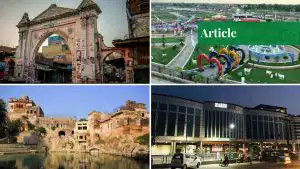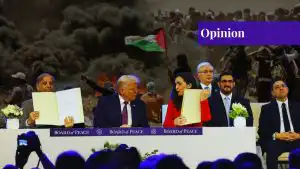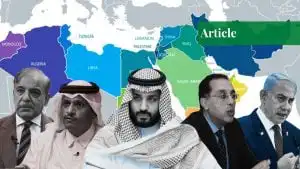Women are usually marginalized and prevented from participating in public and political arenas in societies characterized by structural inequality and patriarchal norms; where violence and conflict generally prevail. Female peacebuilding is a need of the time in present-day Pakistan.
While understanding peace, another term emerges i.e., “negative peace.” It is the absence of physical violence. An alternate vision of this is positive peace—defined by the late Johan Galtung, as the sustainability of equality, justice, and peaceful interactions within a society. It is an ideal portrait of how a society should be. By addressing the root causes of conflict and structural inequalities, and promoting a culture of peace—positive peace seeks to improve communities’ overall security and stability, ultimately fostering peacebuilding. Women play a crucial role in peacebuilding and post-conflict reconstruction of societies through their involvement in national security and decisions that secure peace.
Significance of Women and Girls Participating in the WPS (Women, Peace and Security) Agenda
For the first time, the impact of conflict on women and the necessity to include them as active actors in peacebuilding was explicitly acknowledged by the international community in 2000 when the United Nations Security Council (UNSC) enacted Resolution 1325 on WPS.
There are different ways that men and women view peace. Women frequently experience violence at the hands of their husbands, neighbors, relatives, and cultural groups. As a result, they embrace a broad definition of peace, defined as “the fulfillment of social and economic justice, equality, human rights, and fundamental liberties within society as well as the absence of war, violence, and hostilities.”
Men, on the other hand, are more likely to link peace to the lack of physical conflict. A majority of men in Pakistan view peace as having solid ties with their neighborhoods, communities, villages, and districts.
Due to this visceral difference, women’s perspectives and inclusion in security and policymaking are even more relevant and important, as is their participation in peace processes and conflict resolution which inevitably promotes peacebuilding.
Pakistan’s Case Study: Impact of Conflict and Crisis on Women
Pakistan’s history of conflict demonstrates how the country’s pace of human insecurity has increased. According to data from the South Asia Terrorism Portal, since Pakistan started its “War on Terror,” almost 60,000 people have died in various terrorist attacks. According to the Economic Survey of Pakistan, the cost of war up until 2016 was a little over $118 billion. The highest impact of this violence has been on Pakistan’s most vulnerable group i.e. its female population.
A majority of women in Pakistan are frequently restricted to their homes and engage in little to no public life which makes them more susceptible to abuse, exploitation, and violence during times of crisis. Following a crisis or conflict—abuse, and sexual violence prevent women and girls from pursuing economic opportunities and receiving basic education and medical care.
The mobility of women has been negatively impacted by violent extremism, particularly in KP. For instance, the Taliban in Swat prohibited women from working or even leaving the house without a male family member. This harmed household incomes and women’s access to healthcare facilities in the area.
Many of the women who were displaced due to the military operations in Khyber Pakhtunkhwa province lacked proper registration documents. They also faced limited access to basic humanitarian facilities. Many displaced women in Malakand during the 2009 military operation did not receive food and cash allowances. These facts highlight how odds are stacked against women in every circumstance, be it in times of peace or conflict.
Limited Participation of Females in Peacebuilding
One of the main challenges to guaranteeing women’s safety and well-being in peace processes is their lack of visibility.
In Pakistan, women experience gender-based violence, discrimination, and a lack of representation in peace negotiations and national policy-making processes. The Punjab Protection of Women Against Violence Act 2016 and other similar laws are generally unsuccessful, despite the government’s constitutional and international commitments under the UN Convention on the Elimination of All Forms of Discrimination Against Women (CEDAW) to address gender inequality.
The Pakistani Constitution, the Harassment at Workplace Act, the Domestic Violence Bill, the Acid Throwing Bill, the Pakistan Penal Code (Amendment 509), and the Anti-Women Practices Acts are significant achievements that go a long way towards protecting the rights and welfare of women. However, they fail to deal with the issue of security from a female perspective.
Despite holding 33% of the seats in the parliament, women are unable to close the gender gap and protect their interests. Established social attitudes and powerful political interests continue to oppose initiatives such as the Women’s Protection Bill. Pakistan has to uphold both its signed international commitments and its constitutional duties in this regard.
Cultural and Social Barriers
Traditional gender roles restrict the participation of women in peacekeeping and peacebuilding. Social norms in Pakistan restrict women to household responsibilities, which limits their ability to lead and participate in public peacebuilding initiatives.
Many women, particularly in rural regions, have limited access to education, which makes it difficult for them to participate meaningfully in efforts to promote peace. There is less visibility of women’s issues in political parties, and employers are often reluctant to promote women because of their perceived family duties.
Pakistan’s low ranking in the global gender gap index (145 out of 146) is indicative of the country’s ongoing structural gender inequality. Women often experience disparities in employment, education, and health care. Their socialization processes create a sense of fear and subordination that hinders them from pursuing leadership roles. Whereas men’s socialization creates a powerful self-image that, as a side-effect, limits opportunities for female growth. More progress is hampered by the fact that female lawmakers, who are frequently from elite families, might refrain from questioning established norms to win support.
Female Peacebuilding Efforts in Pakistan
Increased engagement in both public and private decision-making is the outcome of having greater knowledge, financial resources, and income-earning potential—all of which contribute to confidence and self-esteem. Despite patriarchal challenges and inequality, some cases showed the great efforts of female peacebuilding in Pakistan.
SHE—The Peace Builder
In the provincial capitals of Pakistan, the Aurat Foundation began executing “SHE—The Peacebuilder,” also known as “Khuwateen Muamaar-e-Aman” in 2021. This project aimed to strengthen the capacity of 75 women peace architects (WPAs) to engage in peacebuilding and conflict resolution processes. The WPAs underwent vital training, and acquired knowledge and specialized abilities as a result, enabling them to work with stakeholders in the government and civil society. This has helped them promote peace and bolster democratic peacebuilding processes in Pakistan.
Khwendo Jirga
The most suitable form of conflict resolution in Pakhtun culture is the “jirga,” which is made up of elderly male members of the community. In many jirga resolutions, women are seen as compensation for settling various disagreements.
In 2013, a brave woman from Khyber Pakhtunkhwa’s District Swat formed the first-ever women’s jirga, known as the “Khwendo Jirga” (Sisters’ Council), in response to this issue. In Swat, the Sisters’ Council is an innovative platform that educates women about their fundamental rights. The council works to prohibit local jirgas from making unconstitutional judgments and opposes legislation that discriminates against women.
88% of women acknowledge that the council has helped them claim their inheritance. They are involved in decision-making, giving them the power to address problems at home. Over a thousand cases have been resolved by the council, the majority of which included domestic abuse.
PAIMAN Alumni Trust
Founded in 2004 by Mossarat Qadeem, the PAIMAN Alumni Trust is a group that works to prevent and combat violent extremism in Pakistan. The mission of PAIMAN is to educate women and youth in the conflict-ridden areas of KP and FATA about the dangers of radicalization and extremism.
To establish a network of peacebuilding between the two bordering nations, PAIMAN is collaborating and networking with women’s organizations in Afghanistan as well, under the framework of UNSCR 1325.
The US Institute of Peace (USIP) and the Institute for Inclusive Security partnered in August 2010 to launch the Pakistani Women Moderating Extremism program, which sought to raise awareness of and empower Pakistani women to counter extremism. Inclusive Security, in partnership with PAIMAN Alumni Trust, demonstrates that women not only possess a great understanding of the conflicts within their societies, but they also provide well-informed and practical solutions for preventing, responding to, and reconstructing said societies after violence. The organization, procedures, and results of peace processes are also modified when women participate in formulating them.
Peace Education and Development Foundation (PEAD)
Since 2002, PEAD has been working in Pakistan to prevent extremism and radicalization, with a particular emphasis on KP and FATA. PEAD has conducted numerous programs in these areas with funding and assistance from international allies.
The foundation raises a crucial understanding of non-violence, the impacts of radicalization, religious and societal peace, good governance, democracy, and human rights. PEAD promotes the values of responsible citizenship, democracy, and social cohesion for progressive, peaceful, and sustainable development in Pakistan.
PEAD’s executive director, Sameena Imtiaz, coordinated and facilitated the new efforts in collaboration with other peace-focused organizations. PEAD worked with Save the Children (Sweden) on a peace education project in 6 government, secondary, and middle schools, as well as 6 madrassas, in Peshawar.
Mukhtar Mai Women’s Organization
In 2002, Mukhtar Mai, well-known worldwide, broke gender norms in Pakistan and demanded compensation for the pain and brutality she experienced as a victim of gang rape by 13 men. This action solidified her reputation as a champion of women’s rights. Previously, it was expected of women to commit suicide in response to such an act of dishonor. However, Mukhtar rose to fight not only for her rights but also for the rights of all oppressed Pakistani women.
Under the motto “ending oppression through education,” she opened “Mukhtar Mai’s Girls Model School” with government funds. This has now developed into the Mukhtar Mai Women’s Welfare Organization. This organization is committed to supporting victims of abuse, assault, and rape who need support and a safe refuge. Mukhtar Mai is now recognized as a symbol of strength and empowerment for her efforts to raise awareness of the problem of violence against women.
The Government of Pakistan identified “gender security” as an essential principle in its first national security policy (2022–2026):
“Ensuring integration of gender equity into national security narratives through full and meaningful participation of women in decision-making, law enforcement, justice sector, and peacekeeping.”
The significance of female engagement in Pakistani peacebuilding initiatives is becoming increasingly apparent. For progress to be sustained, legislation must be put into practice and concerns of gender inequality must be addressed to empower women and encourage their political participation.
If you want to submit your articles, research papers, and book reviews, please check the Submissions page.
The views and opinions expressed in this article/paper are the author’s own and do not necessarily reflect the editorial position of Paradigm Shift.
Sayba Sagheer is an M. Phil International Relations student at Kinnaird College for Women, Lahore. Her areas of interest include defense and strategic studies, geopolitics, and foreign policy analysis of major powers.






